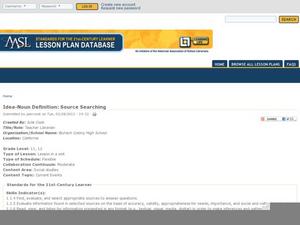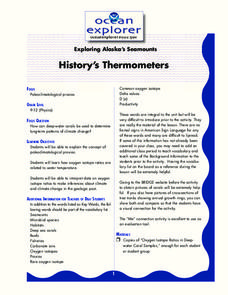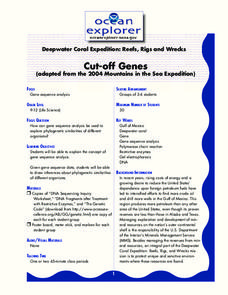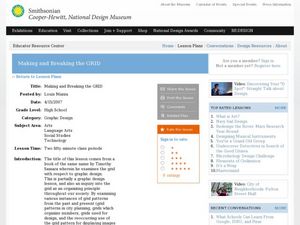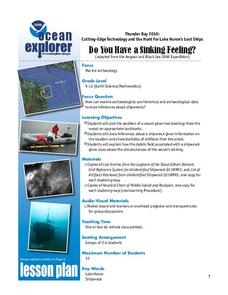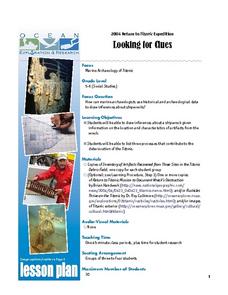Curated OER
Protective Design
Over 3 or 4 class periods your young designers will create a wearable garment that provides some sort of protection from a danger in everyday life. In this fashion design lesson, students investigate fear in our society and brainstorm...
Curated OER
Idea-Noun Definition: Source Searching
A great idea for showing language arts pupils the universality of themes, even in the real world! Have class members choose an idea-noun (peace, justice, war, love, etc.) at the beginning of the year or semester. They complete weekly...
Curated OER
Food for Spaceflight
When astronauts get hungry in outer space, they can't just call and have a pizza delivered. In order to gain an appreciation for the challenges associated with space travel, young learners are given the task of selecting, testing, and...
Curated OER
Inquiry Lesson About Color
Students investigate the color choices artists make in their work, and to practice the scientific process of predicting, observing, inferring, and interpreting. This lesson plan's purpose is to prepare students for a museum visit.
Curated OER
What You See Is What You Get
Students practice visualization as a strategy for reading and comprehending math word problems.
Curated OER
Let Your Motto Be Resistance: African American Portraits: Grades 3-5
Students explore the contributions of African Americans of the 20th century. In this African American history lesson, students examine portraits of Muhammad Ali, Romare Bearden, Lorraine Hansberry, Judith Jamison, and Leontyne Price in...
Curated OER
Do You Have a Sinking Feeling
High schoolers determine how marine archaeologists use historical and archaeological data to draw inferences about shipwrecks. Students plot the position of a shipwrecked vessel, and draw inferences about the shipwreck from artifacts...
Curated OER
Marine Archaeology
Students examine marine archaeology. In this archaeological data lesson, students see how archaeologists use data to make inferences about shipwrecks. Students read data and make their own inferences, write about marine life and...
Curated OER
Shipwreck Mystery
Students draw inferences about a shipwreck. In this marine archaeologist instructional activity, students examine historical and archaeological data to draw inferences about the age and identity of shipwrecks.
Curated OER
Wreck Detectives
Students investigate shipwrecks. In this marine archaeology lesson ,students collect data and make inferences about the causes of shipwrecks. Students work in groups to create their own model of a shipwreck using clay. Students then...
Curated OER
History's Thermometers
Learners explain the concept of paleoclimatological proxies. In this oxygen isotope lesson plan, students interpret data and make inferences about climate changes in the geologic past.
Curated OER
Sonar Simulation
Students compare and contrast side-scan sonar to other methods used to find objects underwater. In this underwater search lesson, students describe side-scan sonar and make inferences about the topography of an unknown landscape. This...
Curated OER
Cut-Off Genes
Students explain the concept of gene sequence analysis. In this gene lesson, students draw inferences about phylogenetic similarities of different organisms.
NOAA
Through Robot Eyes
How do robots assist ocean explorers in collecting data and images? The final installment in a five-part series has science scholars examine underwater images collected by robots and identify the organisms shown. Groups then calculate...
Polar Trec
What Can We Learn from Sediments?
Varve: a deposit of cyclical sediments that help scientists determine historical climates. Individuals analyze the topography of a region and then study varve datasets from the same area. Using this information, they determine the...
California Education Partners
From Seed to Pumpkin by Wendy Pfeffer
Conduct a lesson that leads into a writing assessment. After reading an excerpt from From Seed to Pumpkin, first graders demonstrate their interpretation of sections of the passage by sketching the details from each part.
Reed Novel Studies
The Great Gatsby: Novel Study
Some people believe that no matter how hard a man works, the American dream will always remain out of reach. A study guide for The Great Gatsby explores the themes, such as the illusory American dream, and elements of F. Scott...
Joel Michel Studies
The Tale of Despereaux: Novel Study
What kind of mouse is Despereaux Tilling ... a field mouse? A white-footed mouse? With the novel study for The Tale of Despereaux by Kate DiCamillo, scholars research the different species of mice and draw pictures of the one that they...
Reed Novel Studies
The Secret Garden: Novel Study
Mary from The Secret Garden finds a key that could possibly unlock the door to a secret garden. Scholars read Frances Hodgson Burnett's class novel and match vocabulary words with definitions, answer comprehension questions, and create...
Curated OER
Making and Breaking the Grid
Students examine the grid in terms of a method of organization in our society as well as graphic design. In this "Making and Breaking the Grid" instructional activity, students design solutions to common problems and draw conclusions...
Curated OER
America's Favorite Landmarks
Learners research using Google Earth a variety of websites to explore America's most prominent and famous buildings. They then compare and contrast architectural styles and write a position paper defending or arguing against their chosen...
Curated OER
Do You Have a Sinking Feeling?
Learners explore how marine archaeologists use data to draw inferences about shipwrecks. In this marine archeology lesson students plot the position of a vessel, draw inferences about a shipwreck and explain the possible circumstances...
Curated OER
Titanic: Looking for Clues
Students make inferences about a shipwreck based on the location of artifacts. They role play as marine archaeologists and list three processes that contribute to the deterioration of the Titanic.
Curated OER
Archeology of the Future
Students are introduced to the basic vocabulary of archeology. Using the vocabulary, they classify artifacts and make inferences about their uses. In groups, they create a chart for the criteria needed to analyze artifacts and share...



